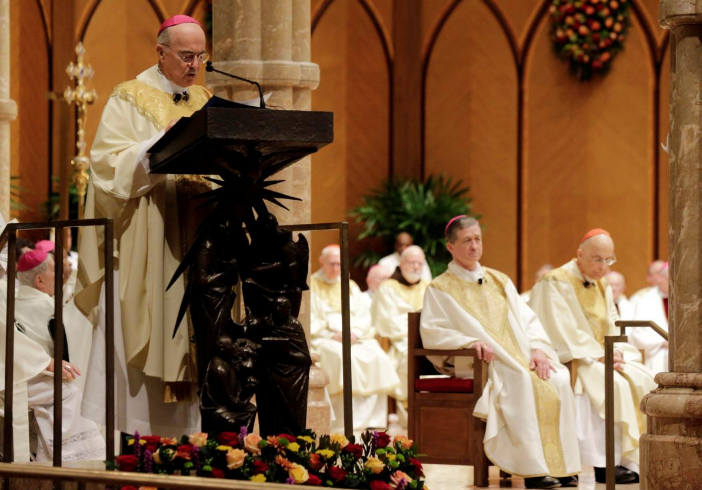Vatican takes off gloves, accuses Archbishop Vigano of 'calumny, defamation'
A top Vatican official on Sunday issued a scathing open letter accusing an archbishop who launched an unprecedented attack on Pope Francis of mounting a 'political frame job devoid of real foundation'.
Cardinal Marc Ouellet said in the detailed, three-page letter that calls by Archbishop Carlo Maria Vigano for the pope to resign because he had allegedly covered up sexual misconduct by a senior American churchman were 'calumny and defamation'.

Ouellet, who heads the Vatican's powerful Congregation for Bishops, issued the letter in response to a bombshell statement on August 26 by Vigano in which he accused a long list of current and past Vatican and US Church officials of covering up for Theodore McCarrick, 88, the former archbishop of Washington, DC, and called on the pope to resign.
Vigano said the pope knew for years about sexual misconduct by McCarrick, the former archbishop of Washington, DC, with adult male seminarians but did nothing about it.
Ouellet's stinging letter, unusually blunt between churchmen, was a point-by-point rebuttal of Vigano's statements.
He said Vigano, who is in hiding and has issued his accusations exclusively through conservative Catholic media which are traditionally antagonistic towards the pope, had let himself 'be convinced of this monstrous accusation'.
Ouellet, a Canadian, said: 'I conclude, therefore that your accusations are a political frame job devoid of any real foundation.'
He urged Vigano to 'come out of hiding, repent for your revolt and return to better feelings towards the Holy Father instead of worsening hostility against him'.
He added: 'Should not ministers of the truth above all stay away from calumny and defamation?'
Church in turmoil
Vigano's statement, combined with a recent spate of sexual abuse crises in several countries, has thrown the Catholic Church into turmoil.
In July, McCarrick became the first cardinal to resign in nearly 100 years after American Church officials said allegations made in a separate investigation that he had sexually abused a 16-year-old boy almost 50 years ago were credible and substantiated..
That investigation was not related to the accusations that McCarrick, who rose to be a key power broker in the American Church, had engaged in sexual misconduct with adult males for years.
McCarrick has said he had no recollection of alleged abuse of the minor, but has not commented on the allegations of misconduct with the seminarians, which allegedly took place mostly at a beach house in New Jersey when he was a bishop in that state.
Vigano alleged that former Pope Benedict, who resigned in 2013, had placed sanctions on McCarrick because of his sexual misconduct with adult males and had ordered him to retire to a life of prayer and penitence and refrain from public ministry.
Vigano claimed that Francis had lifted the sanctions, effectively rehabilitating McCarrick. Ouellet said this was 'false'.
In his letter, Ouellet said there had been no formal sanctions against McCarrick, who had been retired for seven years by the time Francis was elected in 2013.
But Ouellet acknowledged that he had told Vigano that McCarrick should adhere to 'certain conditions and restrictions because of rumours regarding his past behaviour'.
He also denied Vigano's assertion that McCarrick had become a 'great counsellor' to Francis.
'I find it abhorrent that you take advantage of the clamorous scandal of sexual abuse in the United States to inflict an unheard of and unwarranted' attack on the pope, Ouellet said.
He was referring to a grand jury report in Pennsylvania in August that found that 301 Catholic priests in the state had sexually abused minors over the past 70 years.











